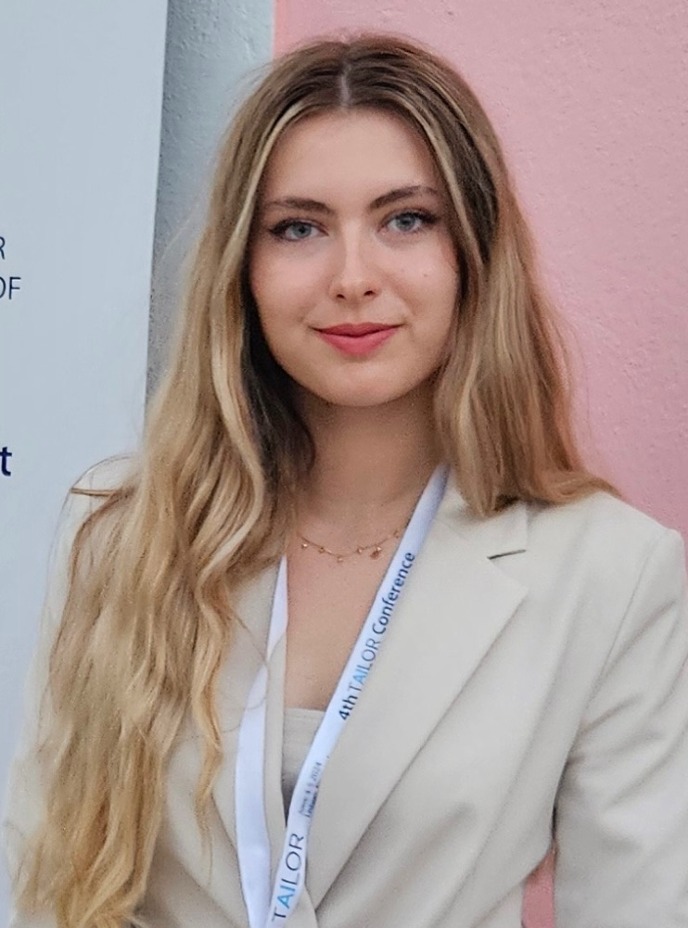Impact | Improving Human-AI Decision-Making in healthcare

In the coming weeks the nominees for the Ben Feringa Impact Award 2025 will introduce themselves and their impactful research or project. The winners will be announced on 13 May. This week: Andra Cristiana Minculescu on her research project on Human-AI Decision-Making in healthcare.
Who are you?
I’m Andra Cristiana Minculescu, a recent graduate from the Master’s in Artificial Intelligence at the Faculty of Science and Engineering. I’m passionate about creative problem-solving and bridging the gap between scientific research and real-world impact.
Could you explain what your research was about?
My research project (conducted during my internship at TNO) tackles a key challenge in medical AI: although AI systems are highly accurate in tasks like image classification, they are used with reluctance since they cannot communicate effectively with human experts within clinical workflows to reach a trustworthy diagnosis. That limits their applicability in real-life medical contexts.
I developed a framework to support decision-making in dermatopathology, specifically during Mohs surgery for skin cancer. It simulates interactions between a doctor and an AI system, where both share their reasoning while classifying ambiguous tissue samples. The innovation lies in equipping the AI with computational Theory of Mind-so it can infer the doctor’s perspective and explain itself more intuitively. Thus, a shared, trustworthy diagnostic decision can be reached. This approach simulates the way doctors collaborate, to make AI a more trusted and adaptable partner in hybrid medical teams.
How can society benefit from your research?
This research addresses one of the biggest barriers to adopting AI in healthcare: trust. While AI systems are already highly accurate in image-based diagnosis, they often fail to fit into real-world clinical workflows because they can’t communicate or collaborate effectively with human experts. By introducing Theory of Mind, I created a framework where AI can align with a doctor’s reasoning, adapt its behavior, and jointly reach trustworthy conclusions-even when diagnoses are uncertain.
While still at a proof-of-concept stage, this human-centric approach could contribute to faster cancer diagnostics, reduced reliance on specialists, and more trustworthy AI support. The research has already sparked real-world interest, from academic conferences to direct engagement with clinicians. It shows that Theory of Mind can improve AI's accuracy, communication, and decision influence in ambiguous diagnostic cases. It’s not just about improving AI, but about building systems that can adapt to human reasoning and team dynamics, something that could benefit many areas of medicine.
What was your personal motivation to conduct this research?
I’ve always been curious about the intersection of people and technology. I wanted to explore AI not only through the lens of intelligence, but also from the perspective of trust and collaboration with humans. When I started this research, we went directly to doctors at UMCG and listened to their concerns and challenges with current AI tools. Many practitioners felt that existing systems didn’t align with their needs or clinical context. This gap motivated me to explore a different approach: one where AI respects human expertise, adapts to it, and acts as a collaborative partner rather than just a passive tool.
I developed a deeper understanding of the complexity of human-AI collaboration and how a human-centric approach, grounded in explainability and adaptability, is key to building trust in high-stakes environments like healthcare. Throughout this journey, I learned the importance of designing AI systems with their intended users, not just for them. In other words, it’s crucial to start by understanding the problem and only then develop the solution.
I would like to thank my supervisors Dr. Harmen de Weerd from the University of Groningen and Dr. Wico Mulder from TNO.
| Last modified: | 25 April 2025 11.50 a.m. |
More news
-
29 April 2025
Impact | Rubber recycling
In the coming weeks the nominees for the Ben Feringa Impact Award 2025 will introduce themselves and their impactful research or project. This week: Francesco Picchioni on his innovative way to recycle rubber.
-
28 April 2025
Engineering Smart Decisions for a Dynamic World
Dynamical systems, i.e. mathematical models that describe how things evolve over time, are at the heart of much of the modern world. The real challenge, however, lies in shaping the systems’ behaviour to achieve a specific goal.
-
25 April 2025
Leading microbiologist Arnold Driessen honoured
On 25 April 2025, Arnold Driessen (Horst, the Netherlands, 1958) received a Royal Decoration. Driessen is Professor of Molecular Microbiology and chair of the Molecular Microbiology research department of the Faculty of Science and Engineering at the...
